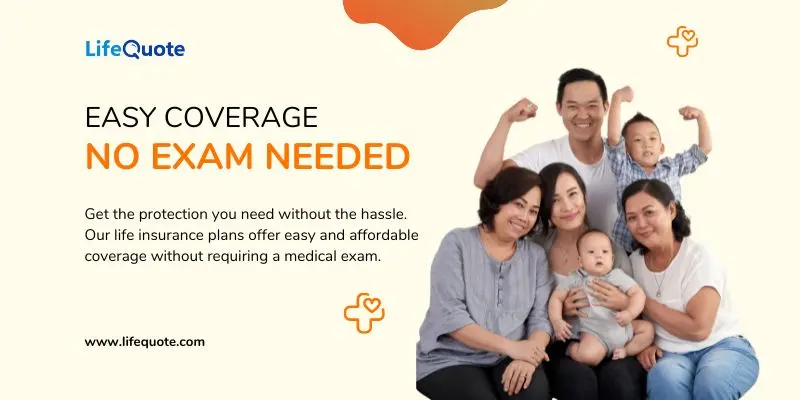- Speak to a licensed sales agent!
- (800) 521-7873
COVID-19 Coverage With Life Insurance

These last few months have seen a relatively localized illness spread across the globe, affecting thousands of people and businesses. With the U.S. currently undergoing a lockdown to prevent the spread of COVID-19, people are beginning to wonder how this new virus will affect their finances, especially their life insurance plans.
Whether you already have a policy or you are planning on purchasing coverage in the near future, this post will help you better understand how the life insurance industry handles pandemics and what steps you can take to secure your financial future as well as that of your loved ones.
Life Insurance and Pandemics
How COVID-19 affects your life insurance depends on several factors. Primarily, those factors are whether you already have an existing policy, whether you have been honest about your recent travel, and whether you have already contracted the virus.
New vs Existing Policies
If you have an existing life insurance policy that has been in force for several years, you don’t need to worry about your policy changing on account of the coronavirus. If you pass away during the policy’s term, even if it is due to COVID-19, your beneficiaries will be paid the death benefit that they are entitled to.
While some policies have special clauses for withholding death benefits after death resulting from high-risk activities or acts of war, your policy will cover you for a COVID-19 related death unless specifically outlined in your policy.
For policies with a fixed price, your premiums will not change. If you have adjustable premiums, such as with universal life, those premiums will still be contingent on your death benefit amount and will not change due to your current health status.
However, if you are not covered and you would like to purchase a life insurance policy during this pandemic, there are some things to take into consideration. For example, be sure to be completely honest about any recent travel you’ve undertaken, even if it is to a high-risk area. This will not necessarily preclude you from getting coverage, and lying will come back to haunt you later.
Also, make sure to follow all CDC guidelines for avoiding contracting COVID-19. If you do contract the virus, or any other virus, you should consider waiting until you have made a full recovery before applying for coverage.
Contestability Period
If you have recently purchased coverage, then you are likely still under the “contestability period”, which is a period of time that spans the first few years of your policy’s life. During this time, your life insurance provider can investigate possible fraud on your count. Hiding things like chronic illnesses, dangerous activities, drug and alcohol use, or risky travel can result in the removal of your death benefit, even after you’ve paid the premiums.
Therefore, it is in your best interest to be honest if you have traveled to a high-risk country such as China or Italy in the past few months. Being caught in a lie will be far more detrimental than having to wait a few more weeks for coverage.
Understanding Pandemics
From isolated cases to widespread crises, general health is always fluctuating. When a contagious disease has an outbreak in a particular geographic region, the World Health Organization (WHO) labels it as an epidemic and deals with it appropriately.
However, if a new disease breaks free from that region and begins to spread unhindered throughout the globe, it is labeled as a pandemic, which requires far more drastic measures to be handled. Pandemics have taken their toll on dense populations in the past, but oftentimes the panic and uncertainty that sets in during times like these can be just as damaging as the disease itself.
As an official pandemic, the novel coronavirus strain known as COVID-19 has shaken much of what we had previously held to be certain, including our confidence in life insurance.
Tips for Applying for Life Insurance During COVID-19
For those who are looking to purchase coverage at this time, here are some things to take into consideration to avoid delays, issues, or even catastrophic changes to your benefits.
Consider Term Life Policies
Some policies, such as Variable Universal Life Insurance, invest a large portion of your death benefit into the stock market. This is risky but can have substantial long-term benefits down the road if the market performs well.
However, COVID-19 is shutting down consumer spending all over the country. This has led to a severe decline in the stock market that hasn’t been seen since 1987. For those that had policies dependent on the market’s performance, their death benefits are deteriorating with each passing hour. For some, they may lose coverage altogether.
Additionally, some policies accrue cash value, which is a savings plan that takes a portion of your premiums and invests it into a growing account. However, at times like these, cash value accounts are falling, causing a valuable aspect of these policies to become liabilities.
The best way to avoid situations like this is to consider purchasing term life coverage. The death benefit for a term policy is fixed, so it is not dependent on the market’s performance and cannot be impacted by pandemics like COVID-19.
Additionally, term life policies are generally far less expensive than whole life and can be converted to whole life down the road if your situation changes.
Canceling Travel
It goes without saying at this point that your international travel plans should be postponed if at all possible if you are planning on purchasing life insurance. More and more countries are being added to the CDC watch list every day. Also, spending hours in an atmosphere-controlled plane with others who may be infected drastically increases your chances of contracting the virus. If it can be helped, wait until the virus has passed before resuming international travel.
If you have traveled to a travel-ban country recently, you may be placed on a two-week waiting period to see if symptoms will appear. If you test negative after that time, then you will likely be in the clear.
If You Already Have the Virus
If you have tested positive for COVID-19, you’re not automatically disqualified. While you will likely not be able to obtain coverage immediately for most conventional policies, your doctor can provide a statement if you make a full recovery that will allow you to have access to those policies again.
Fortunately, COVID-19 functions as a mild cold for a large portion of the population in the United States, meaning that most will likely make a full recovery after a few weeks. Those at risk of dying or experiencing permanent effects from the virus are the elderly, smokers, and those with compromised immune systems from a pre-existing condition. If you are in any of these categories and have tested positive COVID-19, visit a hospital immediately. You can call a life insurance expert later to see how you can protect your family with alternative policies such as no medical exam coverage.
No Medical Exam Policies
Many providers offer special plans for those with pre-existing health conditions at the time of application. By waiving the medical exam requirement, applicants will not have any human contact during the process of being considered for coverage.
No medical exam policies are also some of the fastest and most convenient coverage plans available. You can get approval in minutes and you can do it all online or over the phone, which is perfect for quarantine. However, the premiums are typically higher and the coverage amount is lower than other policies with medical exams.
How LifeQuote Can Help
Ultimately, the COVID-19 pandemic is a time to be cautious, prudent, and prepared—but it isn’t a time to panic. If you have an established life insurance policy with a fixed death benefit, then you have nothing to worry about in terms of how this virus will affect your coverage. If you have a market-dependent policy or you are looking to purchase coverage during this crisis, it may still be a good time to get a policy, but you should proceed with caution.
Fortunately, LifeQuote’s experienced life insurance agents can answer any and all questions you may have about how the coronavirus will affect your existing or prospective coverage. They can also connect you with a provider that best meets your financial and health-based needs. Don’t let fear prevent you from protecting those you love — Contact us today to get started or get a quote from our free online generator.




